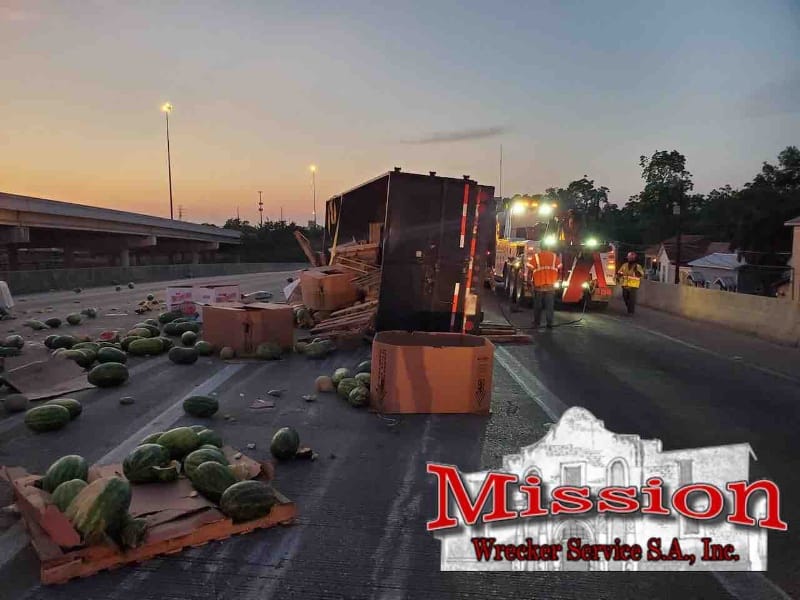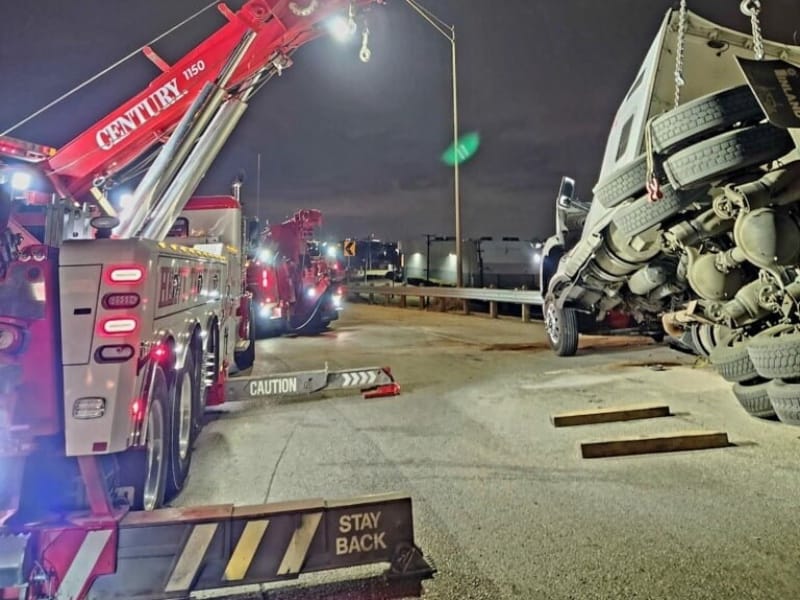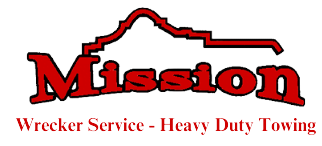Clearing the Chaos
Cargo spills block lanes and disrupt traffic patterns across Houston. A jackknifed trailer spilling freight on the shoulder of Beltway 8 or I-10 delays emergency response, slows delivery routes, and puts drivers at risk. Every Houston accident recovery involving a cargo spill demands quick action. Once we arrive at the scene, our goal is to begin containment and cleanup immediately. Each minute counts. Delays at the scene increase the chance of further collisions, traffic buildup, and hazardous exposure.

What Slows Everything Down
Cargo spills vary widely. On the job, we could encounter trailers full of boxed food, construction materials, or fuel containers tipped and torn open across multiple lanes. Each recovery effort depends on several moving parts, and delays can happen when:
- Cargo details are unknown or incomplete
- The load is difficult to reach due to the truck’s position or road conditions
- Communication is slow between police, DOT, and cleanup crews
- Hazardous materials require additional steps and verification
Our crew needs to understand the load, the scene conditions, and the potential risks. That’s why we bring the right team and gear from the beginning.
How We Tackle Cargo Cleanup
Once we evaluate the scene, we make a plan based on what needs to be removed, what can be salvaged, and what poses a risk to traffic. Our cargo cleanup includes:
- Securing the area and redirecting traffic where necessary
- Removing any damaged trailers or packaging blocking access
- Collecting spilled goods with loaders, brooms, or manual labor
- Coordinating with waste disposal or hazmat when required
- Cleaning surfaces and shoulders to prevent long-term hazards
Our process ends when the load is off the pavement and the area is clear of debris that could interfere with normal traffic flow.
Speed is Front and Center at Spill Scenes
Moving quickly protects everyone on-site. The longer we stay in active traffic lanes, the greater the risk. Speed reduces the danger to cleanup crews, first responders, and motorists.
Fast cleanup during Houston accident recovery helps by:
- Shortening road closures and limiting detour congestion
- Preventing secondary crashes caused by unexpected obstacles
- Reducing potential chemical exposure or environmental harm
- Lowering the impact on commercial transportation schedules
- Supporting emergency crews already working the scene
We know how quickly a blocked highway turns into gridlock. Delays can affect thousands of vehicles in a matter of minutes.
Tools That Keep Us Moving
We equip our team with the gear to handle high-risk scenes without waiting for backup. For Houston accident recovery involving cargo, we often deploy:
- Skid steers for bulk material removal
- Trailers to transport damaged goods or debris
- Absorbents for liquid spills
- Recovery boards, airbags, and winches for equipment shifts
- Lighting and signage for safe roadside operation
We stay in contact with traffic control teams and local agencies to keep the Houston accident recovery organized from start to finish.

Houston Accident Recovery: Mission Wrecker Keeps the City Moving
At Mission Wrecker, we’ve handled hundreds of cargo spills as part of our Houston accident recovery work. The nature of the cargo doesn’t change our approach. Our Houston accident recovery crew moves fast, we stay organized, and we clear the road so others can keep going.
Every spill cleanup is a job we take seriously. Delays are dangerous. That’s why we show up ready to act.

